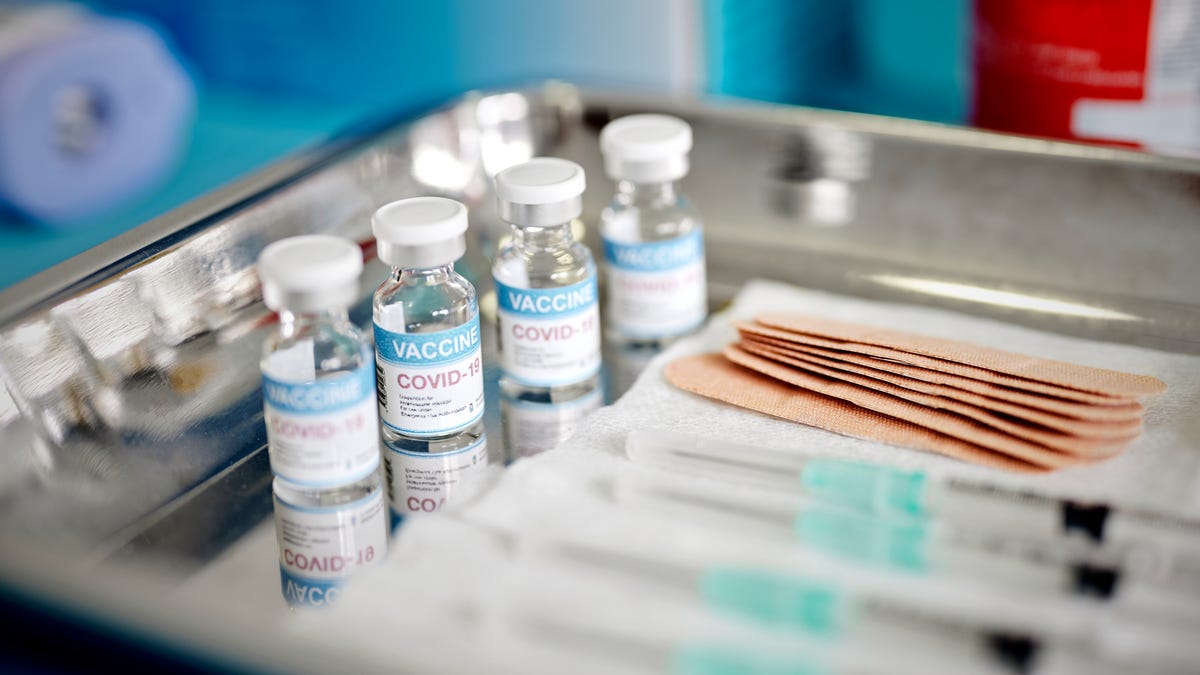CDC panel recommends Moderna and J&J boosters
The panel recommends the boosters to many Americans and makes room for people to "mix and match" shots.

An independent advisory committee to the US Centers for Disease Control and Prevention met Thursday to give guidance on how adults eligible for vaccine boosters should receive them and what type of booster they should get.
People who received either Moderna's or Pfizer's vaccine should get a COVID-19 vaccine booster at least six months after their second shot if they're age 65 or older or living in a long-term care facility, if they're an adult at risk of severe COVID-19 because of a medical condition, or if they're an adult at risk because of their work or setting. The committee didn't recommend a particular booster.
Every person age 18 and older who received Johnson & Johnson's COVID-19 vaccine should also get a COVID-19 vaccine booster at least two months after their shot, the panel voted. The committee didn't recommend a particular booster. For both groups, the vote was a 15-0 "yes."
Before the recommendation becomes official CDC guidance, the committee's vote will need to be approved by CDC Director Rochelle Walensky. Once it's accepted, there will be additional clinical considerations and guidance for individuals to decide if they need a booster, or which vaccine they should receive. Then the booster campaign will be officially rolled out for millions more people who qualify.
On Wednesday, the US Food and Drug Administration authorized booster doses of Johnson & Johnson and Moderna, and it also authorized the use of mixing COVID-19 shots as booster doses, meaning an eligible adult can get a different COVID-19 vaccine as a booster, as long as they qualify based on what shot they originally received.
Some Pfizer recipients have been eligible for a booster since September, though they weren't authorized to receive a booster from a different brand until this week.
Members discussed data that showed that while Moderna's vaccine does have some waning effectiveness, it continues to do its job for most people at protecting against severe disease and death from COVID-19. Effectiveness of Johnson & Johnson's vaccine hasn't shown evidence of waning over time like Moderna and Pfizer's has, but a boost will bring protection up to the level of the mRNA vaccines.
Unvaccinated people remain continue to remain at high risk of severe disease and death from COVID-19 compared to vaccinated people.
Committee members capitalized on the FDA's authorization of mixing COVID-19 vaccines for boosters in their recommendation and didn't recommend people stick to their brand, partly over concerns of a blanket recommendation of Johnson & Johnson's vaccine. Johnson & Johnson is linked to a rare but serious blood clotting condition, though very rare in the general population at 47 cases out of 15 million vaccine recipients in the US, the vast majority of them were in women under 50. Another rare side affect of J&J is a rare neurological disorder found mostly in adult men.
"Certainly, the risks associated with the Janssen (Johnson & Johnson) product need to be clearly stated, especially in those age groups," said committee member Dr. Pablo Sanchez.
Conversely, a young man who's more at risk for the rare (but usually not serious) side effect of heart inflammation following vaccination with an mRNA vaccine may opt for Johnson & Johnson instead, another committee member noted.
Experts also expressed approval of the mix-and-match approach because it may allow for more resourceful use of booster vaccine administration (as providers hopefully won't have to waste as many doses once they open a bottle of vaccine), as well as allow health care workers to work more directly with patients.
"For equity purposes, I would really like to allow better flexibility," said committee member Dr. Camille Kotton.
The issue of public health agencies casting too wide of a net for who needs a COVID-19 booster was also discussed at the meeting, with some members balking at the "frequent institutional or occupational exposure" language for who is eligible, which in turn could cause people who really do need a booster to not seek one out.
"How will people understand if they really should get this when they are at increased risk, if we don't make it clearer?" said Dr. Sarah Long, noting that she's relying on additional clinical considerations the CDC will make about boosters in the coming days.
Some officials, including leaders from the World Health Organization, have criticized booster programs in US and other countries, arguing that extra COVID-19 shots shouldn't be going into the arms of fully vaccinated healthy adults while as little as 2.9% of people in low-income countries have received just one dose of a coronavirus vaccine.

